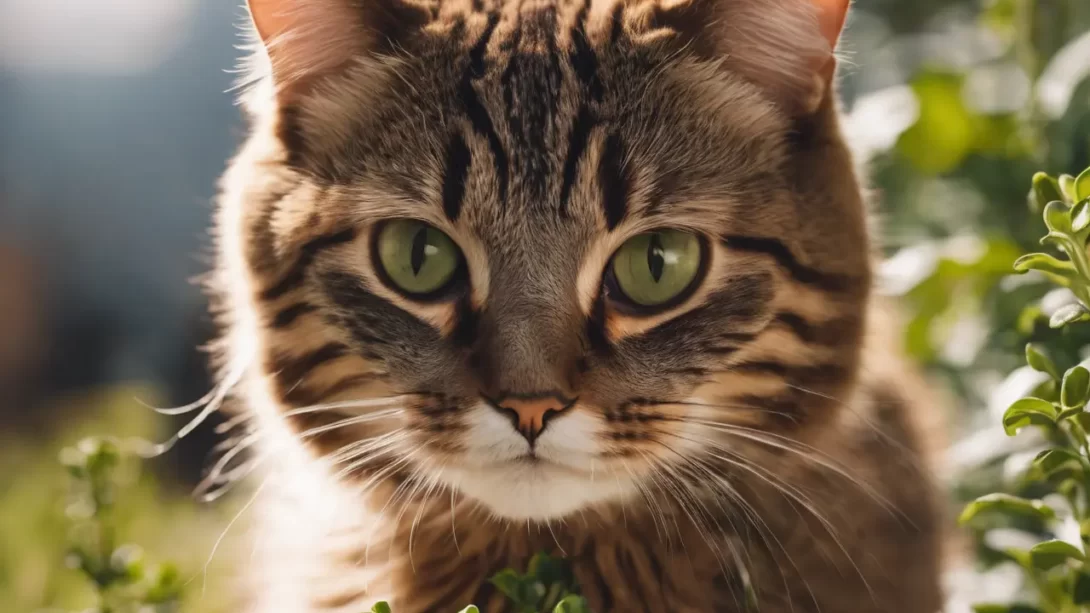Thyme is a familiar sight in many kitchens and gardens, known for its distinctive aroma and culinary versatility. But for cat owners, a crucial question often arises: is this common herb safe for their feline companions? This article delves into the safety and potential benefits of thyme for cats, providing essential information for pet owners who want to ensure the well-being of their furry friends.
What is Thyme?
Thymus vulgaris, more commonly known as thyme, is a perennial herb belonging to the mint family. It is characterized by its small, aromatic leaves and woody stems, thriving in sunny, well-drained environments. Thyme is not just a culinary staple; it’s also been used historically in herbal medicine for its therapeutic properties. In many households, thyme is readily available, either as a fresh herb in the garden or as a dried spice in the kitchen, making it easily accessible for use in both cooking and potential pet-related applications.
The Safety of Thyme for Cats
When it comes to cats and thyme, the primary concern for pet owners is toxicity. Fortunately, thyme is not listed as a toxic plant for cats by the American Society for the Prevention of Cruelty to Animals (ASPCA). This means that, in general, thyme is safe for cats to ingest in small amounts. However, it’s important to consider that while thyme itself is not toxic, its essential oils can be if used inappropriately or in excessive amounts. Cats have a unique sensitivity to many essential oils and compounds, making it crucial to understand the safest ways to offer thyme to them.
Health Benefits of Thyme for Cats
Thyme isn’t just non-toxic for cats; it can also offer them several health benefits. This herb is known for its anti-inflammatory and antibacterial properties, which can be beneficial for cats, especially those with certain health conditions. Thyme can aid in digestion and help alleviate issues like gastrointestinal upset, which is common in felines. Additionally, its antifungal and antiseptic qualities can support overall health. However, it’s essential to remember that these benefits are most effective when thyme is used in moderation. Overconsumption can lead to digestive upset or other health issues in cats.
How to Safely Introduce Thyme to Your Cat
Introducing thyme to your cat should be done cautiously and gradually. Start by offering small amounts of fresh thyme leaves. Dried thyme can also be used, but it’s more potent, so it should be given in even smaller quantities. Thyme essential oil is generally not recommended for cats due to its concentration and the risk of toxicity. Observe your cat closely for any adverse reactions after they consume thyme. If you notice any unusual behavior or symptoms, discontinue use and consult your veterinarian.
Always ensure that the thyme you offer to your cat is free from pesticides and other chemicals. If you grow thyme at home, make sure it’s accessible to your cat in a way that allows them to nibble on it safely. When introducing any new food or herb to your cat’s diet, it’s advisable to consult with a veterinarian to ensure it aligns with their specific health needs and dietary restrictions.
Alternatives to Thyme for Cats
While thyme is a safe and beneficial herb for cats, it’s not the only one. There are several other cat-friendly herbs and plants that can be included in your pet’s environment for added variety and health benefits. Catnip, for instance, is a well-known favorite among cats, offering a safe and natural way to stimulate playful behavior. Other herbs like valerian, chamomile, and dill are also generally safe for cats and can provide similar benefits to thyme, such as aiding digestion and promoting relaxation.
Creating a cat-friendly herb garden is an excellent way to provide your feline with access to these beneficial plants. When planning your garden, ensure that all plants are non-toxic to cats and avoid using any harmful pesticides or chemicals. Place the garden in an area that your cat can easily access, and consider planting a variety of herbs to see which ones your cat prefers. Always supervise your cat’s interaction with the garden to ensure they don’t overindulge in any particular herb.
Conclusion
Thyme, along with other select herbs, can be a healthy addition to your cat’s environment. It offers various health benefits and is generally safe when introduced properly and used in moderation. However, it’s important to remember that every cat is different, and what works for one may not work for another. Consult with your veterinarian before making any significant changes to your cat’s diet or lifestyle. With the right approach, incorporating cat-friendly herbs like thyme into your pet’s life can be a rewarding experience for both you and your furry friend.



